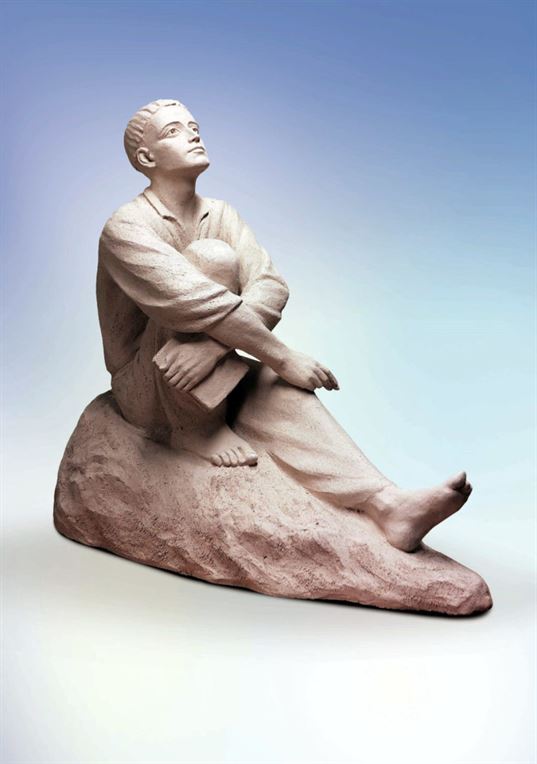Grigory Skovoroda. 2012.
Author: Alexey Leonov
Material: Shamotte
Location: Private collection
Size: 45,5 х 49 х 25
“Collect your thoughts within yourself and look for real blessings in yourself.”
The famous wandering philosopher (years of life 1722-1794) was born in the village of Chernukhi, not far from Poltava, in the family of a Cossack priest. Having studied European languages, history and philosophy at the Kiev-Mohyla Academy, for three years he traveled on foot to the holy places and museums of Poland, Hungary, Austria, Italy, possibly Germany. During the pilgrimage, he mastered ancient Greek, Hebrew and Latin, ancient and modern European philosophy.
From 1759 to 1769, Skovoroda became a catechism teacher at the Kharkov Collegium three times, but, despite the fact that a circle of like-minded students formed around him, he had to finally give up teaching because of Metropolitan Samuil’s critical assessment of his course.
Since 1769, the period of wanderings of the philosopher begins – the only way to avoid the persecution of secular and spiritual authorities. The philosopher-theologian passed through the territories of the Azov region, Voronezh, Oryol, Kursk, Sloboda provinces. He stayed in Rostov, stayed in the Don Cossack Region. Being one of the most educated people of his time, Grigory Skovoroda most of all valued inner freedom and was never tempted to offer a quiet lucrative position. He always defended his own dignity before the mighty of this world – a world that caught him with sticky nets of profit and convenience. The life of a homeless wanderer, a lover of the sacred Bible, passed among nature. He wore a simple shirt, all his belongings were with him – a flute, a staff, a bag of books and bread. With the first rays of the sun, he woke up from a short, no more than four hours a day, sleep. He was always in a good mood, for which people loved him and sought to communicate with him. During his conversations with ordinary people, Cossacks, peasants, the philosopher always turned to the human mind and soul, calling for morality not only in words, but also in his way of life.
“… It’s not a small thing: to know yourself.”
Grigory Skovoroda gives an idea of the structure of the world, which can be conditionally represented as three parts of the whole: large, small and symbolic. Nature or space is a big part of the world. The small world is enclosed in the microcosm, that is, in man. A special world that unites everything is a symbolic world, contained in the Bible. In each world the spirit, God or eternity acts as a dominant. God is the eternal principle, present in everything, but invisible, beyond the earthly measure and beyond time. God manifests in the world through love
Throughout his life, the poet proved that a person’s happiness does not depend on place and time, flesh or blood, is not contained in a high position, power or wealth, but only in the love that has been cultivated in the heart.
According to the philosopher, only everything natural is important and valuable in life. According to the thinker’s theory, each person has his own destiny, his own specific business, which Grigory Skovoroda called “kind of work.” The meaning of human life is to find what suits oneself, and discard the unnecessary. The philosopher described God’s spark in every person as a kind of vessel that God fills with talent for human use. Grigory Skovoroda called the moment of realizing one’s own destiny the realization of God’s plan. The philosopher calls to understand one’s nature, but not by reason, but by knowing the world around through symbols (the Bible). After knowing your inner “I”, you can proceed to kindred work. The main thing in work is desire. In the view of Grigory Skovoroda, a society where everyone does what they love is happy and beneficial to themselves and others. The greatest happiness in a person’s life is to find oneself that “lives in the inner heart of our world, existing in harmony with God.” The source of unhappiness, according to the philosopher, is “unconscience”. It is a pure conscience, a sincere striving for the truth that leads to the revelation of the spark of God.
“Philosophy is the main goal of human life,” said Skovoroda. The main thing in a person is the spirit, heart, thoughts. A person is carried away by various goals: to saturate the womb, delight the eyes, give life to clothes or things, but these goals cannot be true. Philosophy, the love of wisdom, leads to “giving life to the spirit, nobility to the heart, lightness to the thoughts” and is true in life. Gather your thoughts within yourself and look within yourself for real blessings. Dig a well inside yourself for the water that will irrigate both your home and your neighbor’s.
________
Feeling the day of his death, in 1794 Grigory Savvich left all the manuscripts for preservation to his beloved student, Mikhail Kovalinsky. On the day of departure, the philosopher washed his body, put on clean clothes and left this world in complete peace. According to the memoirs of his contemporaries, the philosopher bequeathed to write the following words at the place of his burial: “The world caught me, but did not catch me.”




